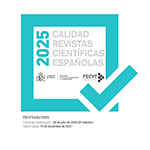De la pobreza como riqueza en San Agustín, Martin Heidegger y Giorgio Agamben
Resumen
La filosofía ha tratado a la pobreza como riqueza desde diversas aproximaciones. Sin embargo, en cada una de ellas es esencial la llamada a vivir una vida justa y feliz, inseparable de su forma y que, a la vez, abierta radicalmente a la expropiación por lo inapropiable. Confesión y don del Espíritu Santo en San Agustín, vínculo esencial de los pueblos de Occidente con lo Libre-liberante y, así, abiertos a su destino histórico y ontológico en Martin Heidegger, lo neutro ni animal ni humano en un vínculo con lo inapropiable en Giorgio Agamben. En cada uno de estos casos se pone en jaque a la tradición de la metafísica que culminó en el nihilismo, la voluntad de poder y la lógica del valor. Resulta relevante volver a la cuestión de la pobreza tanto para pensar una vía de salida a la metafísica y a la biopolítica, como también para indagar en qué medida el cristianismo excede a la historia de la metafísica.
Descargas
Descarga artículo
Licencia
La revista Logos. Anales del Seminario de Metafísica, para fomentar el intercambio global del conocimiento, facilita el acceso sin restricciones a sus contenidos desde el momento de su publicación en la presente edición electrónica, y por eso es una revista de acceso abierto. Los originales publicados en esta revista son propiedad de la Universidad Complutense de Madrid y es obligatorio citar su procedencia en cualquier reproducción total o parcial. Todos los contenidos se distribuyen bajo una licencia de uso y distribución Creative Commons Reconocimiento 4.0 (CC BY 4.0). Esta circunstancia ha de hacerse constar expresamente de esta forma cuando sea necesario. Puede consultar la versión informativa y el texto legal de la licencia.











